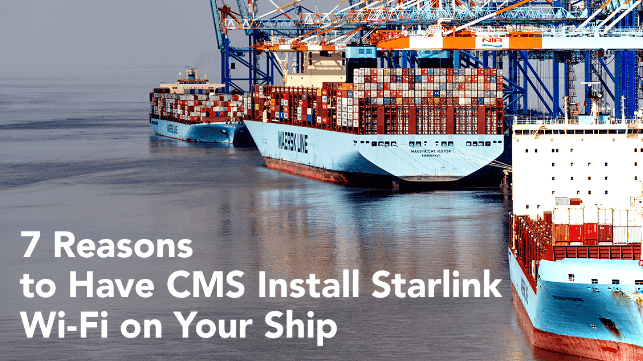Waves of Connectivity: Why You Should Install Starlink WiFi on Your Ship

Previously relying solely on radio communication and satellite technology, ships are turning to Internet and cloud-based resources to improve their productivity, efficiency, safety, and wellbeing of their crews. On land, connectivity has become an essential part of our daily lives, and, now, the need for internet access extends out into the sea as well. Bringing Wi-Fi onboard comes with a plethora of advantages, ranging from enhancing crew welfare to optimizing operations and safety.
Once isolated from the digital world, cargo ships are increasingly embracing connectivity thanks to Starlink. Starlink is a low Earth orbit satellite internet constellation operated by SpaceX (Elon Musk) that provides lightning-fast broadband internet access to over 60 countries. Leveraging advanced satellites and user hardware, coupled with deep experience with spacecraft and on-orbit operations, Starlink delivers high-speed, low-latency internet that is capable of supporting streaming, online gaming, video calls, and more.
In addition to the clear efficiency advantages of adding Wi-Fi to your ship, compliance with the 2022 Safer Seas Act requires internet installation on your vessel. The passing of the Safer Seas Act, a new maritime law in the United States that aims to make the industry safer for all aboard in relation to sexual assault, mandates the owner to install video and audio surveillance systems aboard applicable vessels not later than December 23, 2024, or during the next scheduled drydock, whichever date is later. These video surveillance systems must have audio capability and will need internet access to work correctly.
7 Reasons to Have CMS Install Starlink Wi-Fi on Your Ships
1. Crew Welfare and Morale
As most of us know, life on a cargo ship can be isolating, with crew members spending weeks or even months at sea away from their loved ones. Wi-Fi provides a lifeline to the outside world, so crew members can connect with family and friends via video calls, email, and social media. This connectivity helps create a more positive and mentally healthy working environment, ultimately leading to a happier and more productive crew.
2. Real-Time Communication and Information
In an industry where quick decision-making is crucial, cargo ships equipped with Wi-Fi can access real-time weather updates, navigational information, and communication with other vessels. This immediate access to information allows for better route planning and safer navigation through challenging conditions. It also enables quick communication with onshore personnel, suppliers, and authorities, improving overall operational efficiency.
3. Reduced Operational Costs
Wi-Fi connectivity allows ships to implement remote monitoring and predictive maintenance systems. These systems can track the vessel’s performance, engine status, and equipment condition, sending data to onshore teams for analysis. By addressing maintenance needs proactively, cargo ships can minimize downtime, reduce operational costs, and prevent unexpected breakdowns.
4. Access to Online Training and Resources
The maritime industry is continually evolving with new regulations and safety standards emerging. Crews could access online training materials and resources, staying up-to- date with the latest industry knowledge and best practices. This continuous learning contributes to enhanced safety, better navigation, and compliance with regulations, ensuring the ship operative efficiently and legally.
5. Increased Productivity
The onboard office tasks, such as inventory management, record-keeping, and communication with port authorities, are essential for cargo ships. Wi-Fi allows crew members to manage these tasks with ease, reducing paperwork and risk of errors. This improved productivity can lead to faster port turnarounds, reducing operational costs, and increasing overall efficiency.
6. Improved Quality of Life
Maintaining the mental wellbeing of the crew during long journeys is crucial. Wi-Fi provides access to entertainment options, such as movies, shows, e-books, games, and streaming music. Engaging in these activities during downtime can help reduce stress and boredom to enhance the well-being of life for crew members.
7. Enhanced Security and Surveillance
As mentioned above, the Safer Seas Act requires video surveillance systems with audio capabilities to be installed. In addition to a video surveillance system, you could also think about adding motion sensors, intrusion detection, or other safeguards. Crew members can monitor the ship’s security, allowing them to respond quickly to any threats.
The integration of Wi-Fi on cargo ships has become a necessity rather than a luxury. The benefits are multifaceted, ranging from improving crew welfare and morale to optimizing operational efficiency and safety. By providing access to real-time communication, information, and remote monitoring, online connectivity transforms cargo ships into well-connected, efficient, and safer vessels. The maritime industry’s embrace of technology underscores its commitment to modernization and adaptability in an ever-evolving world.
If you’re ready to upgrade your vessel, Creighton Marine Services (CMS), a family-owned company, can easily and seamlessly add Wi-Fi connectivity to your ship. CMS can perform the following services: Ubiquiti hardware and software integration, Starlink satellite installations, network integration and optimization, camera and phone networks, cloud-based data services, and Safer Seas Act compliance.
With a strong commitment to quality, customer service, and innovation, working with CMS is the easy way to install state-of-the-art technology and network tools that propel your ship toward the future of the maritime trade. Learn more about CMS and what they can do at http://www.creightonmarineservices.com/.
The opinions expressed herein are the author's and not necessarily those of The Maritime Executive.

